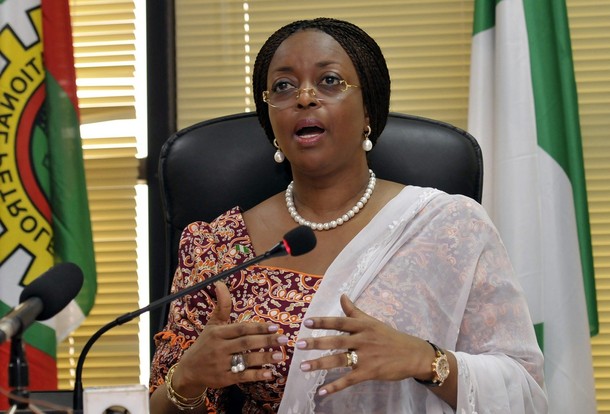- EFCC Submits Report on 100 INEC Officials
The Economic and Financial Crimes Commission has submitted an official report to the Independent National Electoral Commission on the 100 electoral officials who allegedly received part of the $115m (N23bn) disbursed on the instruction of a former Minister of Petroleum Resources, Diezani Alison-Madueke, during the build-up to the 2015 presidential election.
Sources within the EFCC told one of our correspondents that the acting Chairman of the EFCC, Mr. Ibrahim Magu, met with the Chairman of INEC, Mahmood Yakubu, in Abuja last week.
The report was said to have contained the outcome of the investigations and recommendations of the anti-graft agency on the scam.
It was learnt that while some of the officials would face dismissal for flouting of INEC rules, a majority of the officials would be arraigned by the EFCC.
Some of the officials reportedly returned over N300m while houses were recovered from some of them.
An EFCC operative said, “We have submitted the report to INEC and it is left for the electoral body to do its part. They will guide us on prosecution and other matters.
“We heard that some of the electoral officers have gone to court to stop INEC from dismissing them. However, this cannot stop us from bringing criminal charges against them.”
The source said the report contained the outcome of investigations in five geopolitical zones.
“The report contains the outcome of investigations in all the geopolitical zones except the North-Central. It will be done later,” the source added.
He said two houses and two plazas had been recovered from the Resident Electoral Commissioner in Rivers State during the 2015 election, Gesila Khan, while her accounts had been frozen.
According to impeccable sources in the EFCC, Khan allegedly received N185.8m ahead of the March 28 and April 11, 2015 elections.
The source also revealed that the EFCC had arrested one Fidelia Omoile, who was the INEC electoral officer in Isoko-South Local Government Area of Delta State during the 2015 polls.
Apart from tracing over N112.4m to her, the commission also recovered some sensitive electoral materials during a search on her apartments in Edo and Delta states.
The commission also arrested one Oluchi Obi Brown, who was the INEC Administrative Secretary in Delta State.
She allegedly received over N111.5m.
Further investigations by detectives revealed that Brown had about $75,000 in an account in the United States.
The anti-graft agency also arrested one Edem Okon Effanga, who is a retired INEC official.
Effanga was arrested alongside his alleged accomplice, Immaculata Asuquo, who was the Head, Voter Education of INEC in Akwa Ibom State.
Effanga was alleged to have received over N241.1m, which he shared among INEC ad hoc workers during the last election.
Also in Gombe State, 11 electoral officials, who supervised elections in the state during the 2015 general elections, admitted to receiving N120m out of the N23bn.
The electoral officer for the Akko LGA in Gombe State, Ahmed Biu, and the one in charge of Gombe LGA, Mohammed Zannah, allegedly admitted to have collected the bribe from one Yunusa Biri, also a retired electoral officer, who acted as Gombe State coordinator of bribes for electoral officers in the state.
The detective gave the names of some other detained officers as Godwin Maiyaki, Gambo Balanga, Bukar Benisheik, Dukku, Jibril Muhammed, Billiri, Dunguma Dogona, Funakaye, Mohammed Wanka, Kaltungo, Ishaku Yusuf, Kwami, Suleiman Isawa, Babagana Malami, Shongom and Nuhu Samuel.
When contacted, the Chief Press Secretary to the INEC Chairman, Mr. Rotimi Oyekanmi, said he was yet to be briefed on the submission of the report.
“I am not aware for now,” he said on Saturday.
Meanwhile, there are indications that INEC has removed the name of the former REC in Rivers State, Khan, on its list of commissioners in the states.
The Deputy Director, Voter Education and Publicity of INEC, Mr. Nick Dazang, said in a telephone conversation on Saturday that while the commission had nine serving RECS, Khan was not one of them.
He promised to get her true status from the Legal Department of the commission but had not done so as of the time of filing this report.
Dazang stated, “The statistics that I have show that there are nine RECS now, who are serving and she is not one of them.
“The position of the commission has been that the public service rules will apply, but as of now, the EFCC is investigating, then, after the investigation, the public service rule will apply.
“But I know also that there is an internal committee that was looking into the case of those persons.”
Although Dazang could not give the findings of the INEC’s internal probe panel, he said the indicted officials had all appeared before the committee which had had several sittings.
Oyekanmi, the spokesman for the INEC chairman, said the ongoing investigation into the alleged bribery scandal should be allowed to follow due process.
He said, “We should not preempt the outcome of the investigation. When the final decision is made, it would be made public. We have nothing to hide. Like I said, this is a serious crime that people are being accused of, and we have to allow due process.
“They have to be charged to court and we have to give the court the opportunity to deliver judgment. There is no internal panel that will preempt what the court is going to decide. It is what the court decides that will determine the action of the commission, not the other way round.”
He said the affected officials had not been sacked which meant that they would be entitled to their salaries.


 Forex1 week ago
Forex1 week ago
 Naira4 weeks ago
Naira4 weeks ago


 Naira1 week ago
Naira1 week ago
 Company News4 weeks ago
Company News4 weeks ago




 Naira1 week ago
Naira1 week ago




 Naira3 weeks ago
Naira3 weeks ago
 Billionaire Watch6 days ago
Billionaire Watch6 days ago




 Naira5 days ago
Naira5 days ago





















